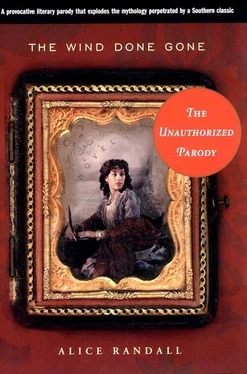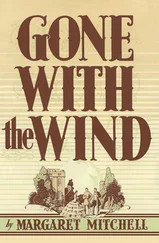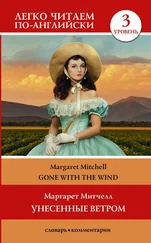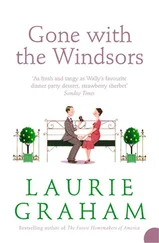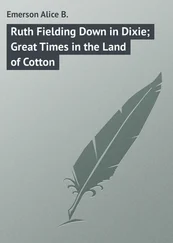“Then let me pour the next cup of coffee," I said.
R. makes "his rounds," as he names them, calling on the mayor, his bankers, hearing the chatter of the town, holding a cracked-kid-gloved finger up to the battering winds of cash, color, and politics each morning, returning to me at noon for his dinner. That's every day. I have no appetite for presiding in my dining room. Most days I give everybody a holiday. His servants, my friends. There are no silent brown ghosts in this house-there's an eye for every hand and more ears than fingers 'round most houses. How the white people live surrounded by spies, I don't know. I can't do it. The slime of hatred on every sliver of soap, every sheet smoothe across every bed. "Our house has the supreme elegance of privacy," he says, referring to the small number of servants.
It unsettles R. that I chose to build my house in the middle of the colored-he would say "section," I will write "community." He would rather I had built on some out skirt someplace that wasn't yet a neighborhood to be known as white or colored. But I like to be able to walk places, to church, to the dry goods, to Beauty's.
Most days I cook. It gives me something to do. But we have a cook, Portia Dred. She chose the name from the stories I told her, from the books in my library. The Act of March 2, 1867, debated over many a joint of Mrs. Dred's beef, created three categories of voters for the state and the primary categories of guests for my table: Negroes loyal to the Union who had never been in jail and had lived in the state a year, preferably those who are making money; Yankees poured down from the North finally resident a year, preferably those minting money; and loyal white Southern citizens who had been here forever but were willing to lie and spout the "ironclad oath," preferably those who have hidden money.
I have two books of recipes, and most all the time I cook from them.
Almost always if we eat alone. But yesterday I made Mammy's chicken croquettes and fresh smashed peas from memory.
I'm still deciding when and if I will return to Cotton Farm. She, Other, is still in residence there. If I go, I will have to share both the place and Mama with her. I am hoping for a letter saying Mammy's turned the corner.
R. doesn't see my thoughts. They are made too small by his own. He loves Mammy, but not when he thinks of her as my Mama; he loves her through Other. He doesn't choose to remember I have a mother. I choose to forgive R. for what cannot be expected of him.
When we moved into this house, he carried me in his arms through the door and up the stairs into the most beautiful bedroom I had ever seen.
When he was making the bed mine, between kisses he said, "Forget everything before now." Over and over he said it. He kissed me so hard. It was the only time he ever begged me. He was on his knees, I was laying on the bed, and he said, "Don't bring your past into this house." But it's breaking in like a robber in the night, and he won't wake up to save me from it, and I don't know if he got a gun anymore would do it. Every day it gets harder to see why he can bring his history into my house, but I can't bring my past. And every day I'm more afraid of my past than I was the day before.
I asked Cook to make the supper. I will try hard to give him what he has begged for, for his sake and my own.
We were served at eight. We began with shrimp etouffe and ended with little pots de creme au chocolate. I wore my Turkish trousers. After dinner, when we were still seated at the dining table, R. tells me what he didn't tell me at noon.
There's a man coming through Atlanta he wants me to meet. I tell him it's not the time, and he smiles in relief. He thinks I'm protecting him from those who would distract him from grief. But then he says we really must have the dinner and I am the one to give it. He flatters me by claiming the superiority of my table-"Never one flavor too many, never one flavor too few"-and I like it. I reward him with an invitation to take a rest with me on the green velvet couch.
He pulls me to him, out of my chair into his lap. Then he waits. I trace his lips with the tip of one of my fingers, then I push the finger into his mouth. When I try to pull it out, his lips tug hard.
The tug is familiar. It steadies me. He's looking at me differently now. What the difference is, I don't know. But I see it. He looks at me hard. I raise my eyebrows. I know better than to speak. He says nothing. He just kisses me and looks at my hand as if it was something foreign.
There's a low wide couch in my bedroom upholstered in green velvet. He loves it when I'm sweet to him on it. I feel it calling to us now.
When I was young I would invite him by saying, "The morning dew is on the southern lawn," and he would laugh at the proper way I invited him to impropriety. I was barely out of my childhood, just fifteen, when he asked, "Is the little bird twittering in its nest?”
“You make it sound so pretty.”
“If you could see what I see." He kissed the lips he could kiss and still let me keep up mumbling proper sounding improprieties: "The morning dew is on the southern lawn." There are certain things we do only on that couch. He calls it visiting the honeysuckle garden. When I was old enough to walk, they put a fan in my hand to shoo the flies off Lady. I seen children play.
Colored and white-colored far from the house, in the fields. Other, everywhere, under tables, in her room. I had no place to play then. My body became my place to play. I became my own playing ground.
Afterward we lie on that couch and talk, his feet propped on my shoulders, my feet propped on his, and I feel braided together. We talk little things, plans for the week, plans for the month, when he will be out of town, how much money I need, how much is left in my account.
He put the heavy string of pearls around my neck. They didn't come from the jewelry store new; they came from the place where you sell things when you need money. A pawn shop. They hang so low, they spill between my breasts, like the foam on fast-running water, a stream of rough white water pouring down onto my belly. I took the edge of the loop that dipped toward my navel and pulled it over his head. We were both encircled in his gold-clasped loop.
Against the smooth gold whiteness of the pearls, the skin of his neck looked yellow, cross-hatched like a dusty yard across which chickens had scratched. He smiled, and there were more lines. I could smell tobacco, coffee, and the shrimp on his tongue. Sometimes I was shrimp and he was the shrimpy taste of me on his tongue. Sometimes he was a pirate and life was a still salty basin of water just off a strand of sand. Sometimes it feels good, sometimes feeling good is enough.
Sometimes I don't remember nothing 'cept being a fresh boiled shrimp between his teeth, swallowed but not devoured in the hours when it seemed that I was born to be no more than a taste on his tongue.
I close my eyes but I don't fall asleep. I still have hunger.
When he thought I had fallen asleep, he tiptoed out of the room, down the front steps, and out the back door of the house he bought for me.
He goes to sleep in what he calls his closet, a small apartment in one of the four hundred buildings that survived the fires of the war, a fine old address.
I have never forgiven Mammy for the hours I stood bare-breasted in the market in Charleston. I don't know how to forgive her and love myself.
After the paste peace of forgetting, she calls to me and I remember.
Forgetting is to forgiving as glass is to a diamond, mockingbird. If that golden ring turns brass, Daddy's going to buy you a looking glass, mockingbird.
Bits and pieces. It comes back to me that way. I had a dream last night I was a girl again. In my dreams I am a girl again. I am sent to the market with a heavy load of rice. A little of the rice seeps out. I notice a fine little trail behind me. I panic. I put down my burden, tie a knot in the hole. I am scared. I know I am not still carrying everything. I am exhausted. I lift my burden with grave trepidation and discover it is lighter. After that I started dropping things on purpose. Bits and pieces. Stuff to carry (a chair, a watch, a sack of rice). I unburden myself over the stretch of the time road, arriving at my destination empty.
Читать дальше
